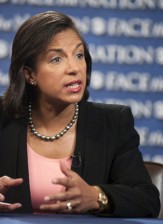US, Libya differ on accounts of Benghazi attack

In this image provided by CBS, Susan Rice, U.S. ambassador to the U.N. speaks on “Face the Nation” in Washington, Sunday, Sept. 16, 2012. A deadly assault on a U.S. consulate in Libya was a spontaneous reaction to an anti-Muslim video, the Rice said Sunday, even as Libya’s president insisted the attackers spent months preparing and carefully choosing their date – the anniversary of the Sept. 11 terrorist attacks. AP Photo/CBS News, Chris Usher
WASHINGTON—Top US and Libyan officials offered starkly different accounts Sunday about the attack on the US consulate in Benghazi that left the ambassador and three other Americans dead.
The US ambassador to the United Nations, Susan Rice, said it began with a spontaneous protest over the anti-Islamic video that had already set off similar protests in Egypt, leading to the storming of the US embassy there.
“People gathered outside the embassy (consulate) and then it grew very violent and those with extremist ties joined the fray and came with heavy weapons… and that then spun out of control,” Rice told “Fox News Sunday.”
“But we don’t see at this point signs this was a coordinated plan, premeditated attack. Obviously, we will wait for the results of the (FBI) investigation and we don’t want to jump to conclusions before then.”
Announcing the arrest of 50 suspects, Libya’s parliament chief, however, blamed the attack on a few foreign extremists who he said entered Libya from Mali and Algeria and pre-planned it with local “affiliates and sympathizers.”
Article continues after this advertisement“The way these perpetrators acted, and moved… leaves us with no doubt that this was pre-planned, determined, predetermined,” Mohammed al-Megaryef, president of the Libyan National Congress, told CBS News.
Article continues after this advertisement“It was planned, definitely, it was planned by foreigners, by people who entered the country a few months ago. And they were planning this criminal act since their arrival.”
Ambassador Chris Stevens is believed to have died from smoke inhalation after becoming trapped in the blazing diplomatic compound, which came under fire from rocket-propelled grenades, mortars and small arms for several hours.
Al-Qaeda in the Arabian Peninsula said the attack was revenge for the killing of the terror network’s deputy leader Sheikh Abu Yahya al-Libi in a drone strike in June, but there is no evidence to support the claim.
US officials initially leaned toward the premeditated, well-planned assault angle and pointed to the fact the attack came on the anniversary of 9/11.
Now they are more reticent, insisting journalists wait for the results of the FBI investigation before leaping to conclusions.
Rice’s comments are the strongest indication yet that — even if the United States does believe the assault was the work of a small band of extremists — it has no evidence to suggest planning prior to the protests.
Leading Republican senator and top Obama administration critic John McCain said it was ridiculous to believe it was anything other than a planned assault by Islamic extremists.
“Most people don’t bring rocket-propelled grenades and heavy weapons to a demonstration,” McCain told CBS. “That was an act of terror. And for anyone to disagree with that fundamental fact I think is really ignoring the facts.”
The reluctance of US officials to give details about the Libya probe betrays their determination to track down those who killed Stevens, the first American envoy killed in the line of duty since 1979.
US spies, Marines and drones are aiding the Libyan authorities in their effort, hampered by the chaotic blend of competing militia and tribal alliances in the wake of the revolution that ousted Moamer Kadhafi last year.
In Paris, French Foreign Minister Laurent Fabius told French TV that the American ambassador died under “absolutely atrocious conditions,” suggesting new details could soon emerge.
Speaking to ABC, Rice denied the United States was powerless to stop the anger spreading through the Muslim world at symbols of US influence, such as diplomatic missions, businesses and fast food restaurants.
Countering accusations from opposition Republicans that weak US leadership was emboldening the extremists, Rice said President Barack Obama had been extremely effective in getting Muslim leaders to protect US facilities and condemn the violence.
“What we’ve seen is that the president has been incredibly calm, incredibly steady, and incredibly measured in his approach to this set of developments,” Rice said.
“His interventions, his leadership, has ensured that in Egypt, in Yemen, in Tunisia, in Libya, and many other parts of the world, that leaders have come out and made very plain that there’s no excuse for this violence.”
The flare-up was not a sign of anti-US sentiment but triggered solely by a “reprehensible and disgusting” movie denigrating the Prophet Mohammed, Rice said, stressing: “We’re not impotent, we’re not even less popular.”